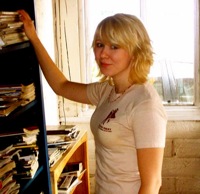OLPCorps CMU Tanzania: Difference between revisions
| (46 intermediate revisions by 5 users not shown) | |||
| Line 1: | Line 1: | ||
=Storytelling: Connecting the past with the future |
==Storytelling: Connecting the past with the future-across cultures-with technology. == |
||
==Who we are== |
==Who we are== |
||
[[Image:Aparna Dargar.jpg]][[Image: |
[[Image:Aparna Dargar.jpg]] [[Image:Roxanne_Benjamin.jpg]][[Image:William_Kampton.jpg]]<br /> |
||
| ⚫ | Aspiring filmmakers Roxanne Benjamin and Aparna Dargar are studying [http://www.heinz.cmu.edu/school-of-public-policy-management/entertainment-industry-management-meim/index.aspx Entertainment Industry Management] at [http://www.heinz.cmu.edu/school-of-public-policy-management/index.aspx Carnegie Mellon's Heinz College |
||
| ⚫ | Aspiring filmmakers [http://wiki.laptop.org/images/1/18/R_Benjamin_Resume_2009.pdf Roxanne Benjamin] and '''Aparna Dargar''' are studying [http://www.heinz.cmu.edu/school-of-public-policy-management/entertainment-industry-management-meim/index.aspx Entertainment Industry Management] at [http://www.heinz.cmu.edu/school-of-public-policy-management/index.aspx Carnegie Mellon's Heinz College of Public Policy and Management]. The two graduate students are teaming with William Kampton, a Tanzanian undergraduate student at [http://www.iaa.ac.tz/08/ the Institute of Accountancy Arusha] (IAA) to implement 100 laptops and a basic technology and online storytelling curriculum at [http://www.epicchange.org/project_shepherds_overview.php Shepherds Junior School] in Arusha, Tanzania. William has worked at the school since its founding by his mother, [http://www.epicchange.org/project_shepherds_mamalucy.php "Mama Lucy" Kampton], a local woman who used to sell chickens and used her income as the school's original "seed" capital. |
||
==Who is the local partner?== |
==Who is the local partner?== |
||
[http://www.epicchange.org/projects.php Shepherds Junior School] is a program of Shepherds Foundation, a Tanzanian NGO led by Ms. Kampton, and is staffed entirely by local teachers. In 2007, US nonprofit [http://www.epicchange.org Epic Change] began innovatively investing in the school's expansion, and in 2008 the school was certified by the Minister of Education to participate in national exams for the first time. The school's Class IV students (now Class V) placed [http://epicchange.org/blog/2009/01/30/1/ #1 out of 117 schools in the Arusha district]. Both Epic Change and Shepherds Foundation have infrastructure in place to support this program over the long term, and their letter of support is available [http://www.epicchange.org/Letter_of_Support_ShepherdsJunior_EpicChange.pdf here].<br /> |
|||
[[Image:tanzania.jpg]]<br />Shepherds Junior School is located in Arusha, Tanzania. The country is among the most impoverished in the world. |
[[Image:tanzania.jpg]]<br />Shepherds Junior School is located in Arusha, Tanzania. The country is among the most impoverished in the world, as illustrated by these [http://www.epicchange.org/project_shepherds_tanzania.php statistics]. |
||
==How will |
==How will we work with the children? What is the impact?== |
||
This program will provide computers and basic technology training at a school that now serves over 300 children, including nearly 200 in the targeted age range (6-12). In addition, we will create a curriculum as part of the students' coursework from 6/17 - 7/31 that will enable students to share their own stories online, using blogs, vlogs and potentially social networks, thereby transforming the children into change agents. The project will result in a short documentary or series of short films that help to share the stories of Shepherds Junior students with the world. As most students are not on campus during August, the final two weeks of the project will be used for knowledge transfer to school teachers and staff, as well as documentary filming. |
This program will provide computers and basic technology training at a school that now serves over 300 children, including nearly 200 in the targeted age range (6-12). In addition, we will create a curriculum as part of the students' coursework from 6/17 - 7/31 that will enable students to share their own stories online, using blogs, vlogs and potentially social networks, thereby transforming the children into change agents. By sharing their stories, the children will help to market a line of [http://shop.epicchange.org stationery & gifts] that they help to design and whose sales provide direct income for Shepherds Junior School. The project will result in a short documentary or series of short films that help to share the stories of Shepherds Junior students with the world. As most students are not on campus during August, the final two weeks of the project will be used for knowledge transfer to school teachers and staff, as well as documentary filming. [http://wiki.laptop.org/images/5/5d/Learning_Manual_V2.pdf The OLPC Learning Manual] will guide the creation of our curriculum. |
||
==Communication== |
|||
The school is English medium, and all team members are fluent in English. In addition, as one of the team members is from the local community, he will serve as a translator as necessary. |
|||
==Ongoing Financial Support== |
|||
In alignment with the values of Epic Change, we are committed to supporting the self-sufficiency of Shepherds Junior School. To do so, instead of providing ongoing "donations," Epic Change empowers the students and staff to share their stories through [http://shop.epicchange.org products] whose sales benefit the school. We will collaborate with the students and staff to tell their stories through vlogs and blogs-using technology and social media to market their products globally, ultimately benefiting the expansion of the school and education of the children. Check out this [http://epicchange.myshopify.com/products/giraffe-stationery-set-of-15 giraffe card] composed of the handprints of 6 -year-old Pius, as well as [http://www.epicchange.org/stories_pius his story]. |
|||
==Project Financial Needs== |
==Project Financial Needs== |
||
RT Travel for 2 US - Kigali - Arusha: $4000 <br /> |
RT Travel for 2 US - Kigali - Arusha: $4000 <br /> |
||
1-Bedroom Apartment Rental in Arusha for 2 months: $2500<br /> |
|||
Miscellaneous Expenses (Food & Supplies): $ |
Miscellaneous Expenses (Food & Supplies): $1750<br /> |
||
Immunizations & Passport/Visa Fees: $750<br /> |
Immunizations & Passport/Visa Fees: $750<br /> |
||
BGAN Satellite Rental & Associated Data Transfer Fees: $1000<br /> |
BGAN Satellite Rental & Associated Data Transfer Fees: $1000<br /> |
||
Total: $10, |
Total: $10,000 USD |
||
==Cross-team Collaboration== |
|||
Two teams from Carnegie Mellon are submitting separate applications in partnership with Shepherds Junior School and Epic Change, as over 300 children attend the school, including nearly 200 in the 6-12 age range. Because of OLPC's stated value of "child ownership", two team awards would give us the opportunity to provide computers to all of the children in the targeted age range at Shepherds Junior School. Both teams have separate objectives. One team will focus on building a social media & social change curriculum, while the other will focus on building an online storytelling curriculum to supplement the school's online efforts that include raising funds for future expansion of the school through entrepreneurship and the creation and sale of [http://shop.epicchange.org products] that share their inspiring stories. Both teams will collaborate to teach basic technology to students, and to perform knowledge transfer to school teachers and staff. |
|||
Latest revision as of 01:31, 3 May 2012
Storytelling: Connecting the past with the future-across cultures-with technology.
Who we are
Aspiring filmmakers Roxanne Benjamin and Aparna Dargar are studying Entertainment Industry Management at Carnegie Mellon's Heinz College of Public Policy and Management. The two graduate students are teaming with William Kampton, a Tanzanian undergraduate student at the Institute of Accountancy Arusha (IAA) to implement 100 laptops and a basic technology and online storytelling curriculum at Shepherds Junior School in Arusha, Tanzania. William has worked at the school since its founding by his mother, "Mama Lucy" Kampton, a local woman who used to sell chickens and used her income as the school's original "seed" capital.
Who is the local partner?
Shepherds Junior School is a program of Shepherds Foundation, a Tanzanian NGO led by Ms. Kampton, and is staffed entirely by local teachers. In 2007, US nonprofit Epic Change began innovatively investing in the school's expansion, and in 2008 the school was certified by the Minister of Education to participate in national exams for the first time. The school's Class IV students (now Class V) placed #1 out of 117 schools in the Arusha district. Both Epic Change and Shepherds Foundation have infrastructure in place to support this program over the long term, and their letter of support is available here.

Shepherds Junior School is located in Arusha, Tanzania. The country is among the most impoverished in the world, as illustrated by these statistics.
How will we work with the children? What is the impact?
This program will provide computers and basic technology training at a school that now serves over 300 children, including nearly 200 in the targeted age range (6-12). In addition, we will create a curriculum as part of the students' coursework from 6/17 - 7/31 that will enable students to share their own stories online, using blogs, vlogs and potentially social networks, thereby transforming the children into change agents. By sharing their stories, the children will help to market a line of stationery & gifts that they help to design and whose sales provide direct income for Shepherds Junior School. The project will result in a short documentary or series of short films that help to share the stories of Shepherds Junior students with the world. As most students are not on campus during August, the final two weeks of the project will be used for knowledge transfer to school teachers and staff, as well as documentary filming. The OLPC Learning Manual will guide the creation of our curriculum.
Communication
The school is English medium, and all team members are fluent in English. In addition, as one of the team members is from the local community, he will serve as a translator as necessary.
Ongoing Financial Support
In alignment with the values of Epic Change, we are committed to supporting the self-sufficiency of Shepherds Junior School. To do so, instead of providing ongoing "donations," Epic Change empowers the students and staff to share their stories through products whose sales benefit the school. We will collaborate with the students and staff to tell their stories through vlogs and blogs-using technology and social media to market their products globally, ultimately benefiting the expansion of the school and education of the children. Check out this giraffe card composed of the handprints of 6 -year-old Pius, as well as his story.
Project Financial Needs
RT Travel for 2 US - Kigali - Arusha: $4000
1-Bedroom Apartment Rental in Arusha for 2 months: $2500
Miscellaneous Expenses (Food & Supplies): $1750
Immunizations & Passport/Visa Fees: $750
BGAN Satellite Rental & Associated Data Transfer Fees: $1000
Total: $10,000 USD
Cross-team Collaboration
Two teams from Carnegie Mellon are submitting separate applications in partnership with Shepherds Junior School and Epic Change, as over 300 children attend the school, including nearly 200 in the 6-12 age range. Because of OLPC's stated value of "child ownership", two team awards would give us the opportunity to provide computers to all of the children in the targeted age range at Shepherds Junior School. Both teams have separate objectives. One team will focus on building a social media & social change curriculum, while the other will focus on building an online storytelling curriculum to supplement the school's online efforts that include raising funds for future expansion of the school through entrepreneurship and the creation and sale of products that share their inspiring stories. Both teams will collaborate to teach basic technology to students, and to perform knowledge transfer to school teachers and staff.


